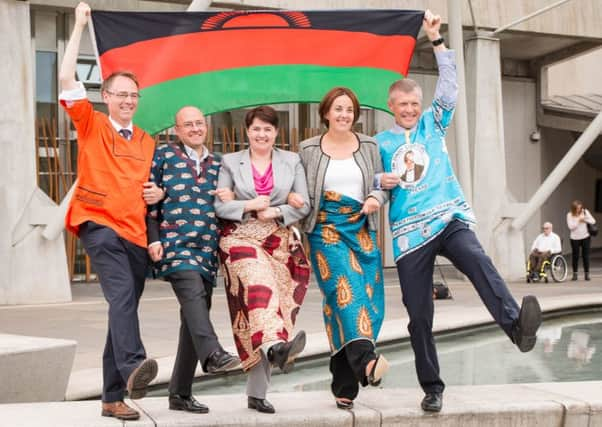Thousand reasons to be proud of '¨our links to the people of Malawi


Behind each of these 1,000 partnerships – across schools, churches, charities, local authorities, businesses, universities and community groups – are hundreds of Scots and Malawians working together in solidarity and friendship. This isn’t a traditional model of international development. It’s something distinctly Scottish: a whole-nation approach, underpinned by sense of dignified two-way partnership, not charity.
It’s easy to be cynical about links led by churches, schools and community groups but there’s strong evidence to suggest these partnerships are having a real impact, in both countries. The University of Edinburgh estimates that there are more than 94,000 Scots involved in links with Malawi, and that these links benefit more than 300,000 Scots and four million Malawians a year.
Advertisement
Hide AdAdvertisement
Hide AdThis is more important than ever, with 6.5m Malawians facing a food crisis caused by the changing climate. Towns and cities across Scotland are working with their partner communities in Malawi to respond to this crisis. The Scottish Government has launched an innovative aid match programme in response to the crisis, committing to match, pound-for-pound, Scottish donations to the special appeals run by Christian Aid Scotland, EMMS International, Oxfam Scotland, and SCIAF.
The Scottish Government’s Malawi Development Programme has always prided itself on doing things differently. Over the last decade it has chosen to work actively with and through Scottish civic society to deliver development assistance. This has allowed the Scottish Government to have a disproportionate positive impact in Malawi by building on the generations of friendship, trust and expertise between the two countries. For every pound invested by the Scottish Government in Malawi, almost £10 of input comes from the people of Scotland.
To help launch the new #1000partnerships report, Dr Allan was joined outside the Scottish Parliament by Ruth Davidson, Kezia Dugdale, Willie Rennie and Patrick Harvie, to meet their own constituents engaged in Malawi links. All five got into the spirit of things, being dressed in traditional Malawian clothing by Malawians living in Scotland.
While not at the photocall, First Minister Nicola Sturgeon said: “This report, produced by the Scottish Government-funded Scotland Malawi Partnership, shows the depth of the enduring relationship we enjoy, with links to Malawi from communities in every part of Scotland.”
Scottish Conservatives leader Ruth Davidson said: “The links between Scotland and Malawi are deep, enduring and worthy of celebration. At heart, this is about friendship. Not just between governments, but between two peoples.”
Scottish Labour leader Dugdale added: “The increasing number of Scots actively involved in links with Malawi through our schools and universities through to charities, hospitals and local businesses shows the kindness at the heart of the Scottish character.”
And Scottish Lib Dems leader Willie Rennie said: “Through education, communication and engagement we are forging a lasting relationship with this fascinating and creative country at the heart of Africa. Together Scotland and Malawi can grow and prosper together.”
And Greens co-convener Patrick Harvie said: “Almost every section of Scottish civic life is now involved with Malawi in some way, with record numbers of community groups, schools, universities and hospitals actively engaged.”
Advertisement
Hide AdAdvertisement
Hide AdTo thank Scotland’s political leaders for getting dressed up, each was given a bottle of Malawi Gin, the latest in a line of high-quality Malawian exports finding new markets in Scotland and contributing to sustainable economic development in Malawi.
David Hope-Jones OBE, Principal Officer, Scotland Malawi Partnership. For Malawi videos with the party leaders, see www.tinyurl.com/1000partnerships. For details on 1,000 Malawi links, www.tinyurl.com/HolyroodMalawi. To donate to the Malawi Food Crisis appeals, www.tinyurl.com/Malawifood